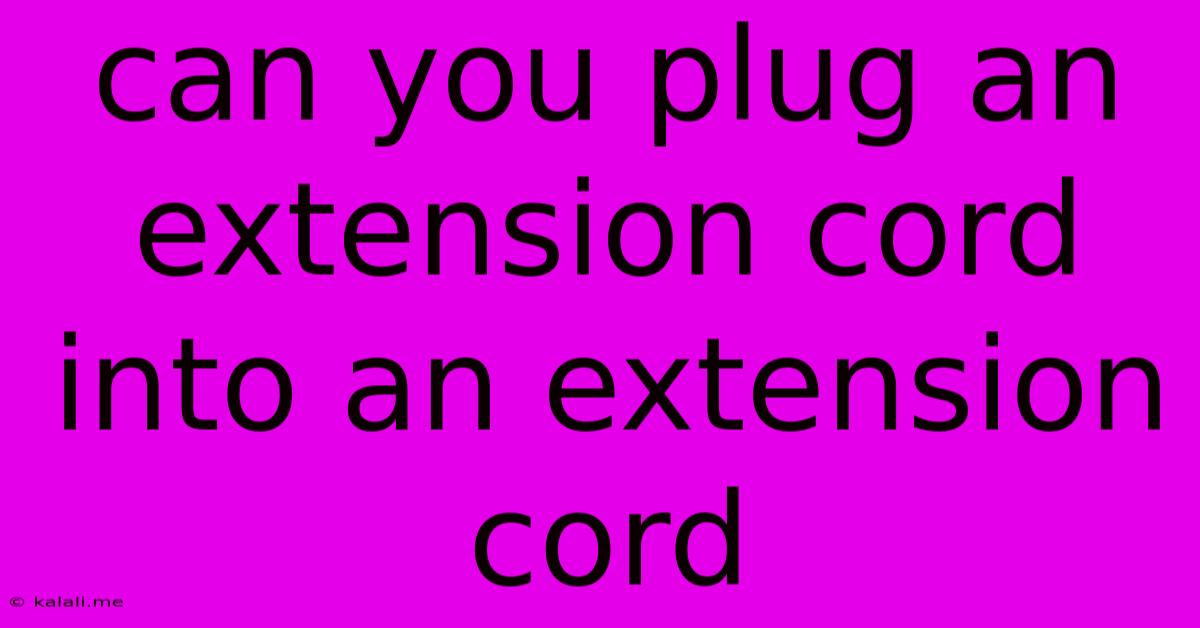Can You Plug An Extension Cord Into An Extension Cord
Kalali
May 19, 2025 · 3 min read

Table of Contents
Can You Plug an Extension Cord into an Extension Cord? A Guide to Safe Electricity Practices
Meta Description: Unsure if daisy-chaining extension cords is safe? This guide explores the risks and best practices for using multiple extension cords, helping you avoid electrical hazards and ensure safety.
Plugging an extension cord into another extension cord – often called "daisy-chaining" – is a common practice, but is it safe? The short answer is: yes, but with crucial caveats. While it's technically possible, doing so improperly can lead to overheating, fire hazards, and damage to your electronics. This guide will help you understand the risks and learn how to do it safely, if absolutely necessary.
Understanding the Risks of Daisy-Chaining Extension Cords
The primary concern when using multiple extension cords is excessive current draw. Each extension cord has a specific amperage rating, indicating the maximum current it can safely handle. When you connect multiple cords, the total amperage demand increases. If the combined load exceeds the rating of any cord in the chain, the wires can overheat, potentially leading to a fire.
Other risks include:
- Voltage drop: Extending the length of a circuit increases resistance, causing a voltage drop. This can lead to reduced power to your devices, causing them to malfunction or not work properly. This is especially noticeable with power-hungry appliances like hair dryers or space heaters.
- Tripping breakers: An overloaded circuit can trip the breaker, cutting power to the entire circuit. This is a safety feature, but inconvenient.
- Damaged cords: Overloading extension cords can damage the insulation and wiring, creating a fire hazard. Look out for frayed or damaged cords and replace them immediately.
When Daisy-Chaining is Acceptable (and When It's Not)
While not ideal, daisy-chaining extension cords might be acceptable in certain situations, provided you follow strict guidelines:
- Low-power devices: Connecting several low-power devices, such as lamps or small electronics, is generally safer than using high-power appliances.
- Short extension cords: Using shorter extension cords in the chain minimizes voltage drop and reduces the risk of overheating. Avoid excessively long chains.
- Check amperage ratings: Always add up the amperage draw of all connected devices and ensure it's well below the rating of each extension cord in the chain. Leave ample safety margin – don't push it to the limit.
- Gauge of the wire: Thicker gauge wires (lower gauge number, e.g., 14-gauge vs 18-gauge) can handle more current and reduce voltage drop. Choose higher-gauge extension cords whenever possible.
- Properly grounded cords: Ensure all cords are properly grounded and in good working order.
When to avoid daisy-chaining completely:
- High-power appliances: Never daisy-chain extension cords when using high-power appliances like heaters, power tools, or vacuum cleaners.
- Outdoor use: Outdoor use requires cords specifically rated for outdoor use and extra caution due to the potential for moisture.
- Improperly grounded cords: Never use damaged or poorly grounded extension cords.
Best Practices for Safe Electrical Usage
Rather than relying on multiple extension cords, consider these safer alternatives:
- Use a power strip or surge protector: These provide multiple outlets in a single unit and often have built-in surge protection.
- Install additional outlets: If you frequently need more outlets, consider having additional electrical outlets installed by a qualified electrician.
- Use heavy-duty extension cords: Invest in higher-gauge extension cords designed for higher amperage loads.
Ultimately, while plugging an extension cord into another extension cord is sometimes unavoidable, it's best to minimize this practice whenever possible. Prioritize safety by understanding your electrical needs, using appropriate equipment, and following best practices for preventing electrical hazards. If you're unsure about the safety of a particular setup, consult a qualified electrician.
Latest Posts
Latest Posts
-
How To Fill A Deep Hole In The Wall
May 19, 2025
-
How To Remove Glue From Tiles
May 19, 2025
-
Can You Castle Out Of Check
May 19, 2025
-
Can You Bring Magnets On A Plane
May 19, 2025
-
Can You Pack Aerosols In Checked Luggage
May 19, 2025
Related Post
Thank you for visiting our website which covers about Can You Plug An Extension Cord Into An Extension Cord . We hope the information provided has been useful to you. Feel free to contact us if you have any questions or need further assistance. See you next time and don't miss to bookmark.